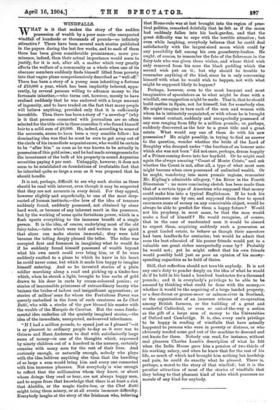It is not, perhaps, difficult to see why such stories
as these should be read with interest, even though it may be suspected that they are not accurate in every detail. For they appeal, however slightly and superficially, to one of the most deep- rooted of human instincts,—the love of the idea of treasure suddenly found, suddenly possessed, not obtained by sheer hard work, or because of any inherent merit in the possessor, but by the working of some quite fortuitous power, which in a flash upsets everything to the immense benefit of a single person. It is the idea, of course, underlying most of the old fairy-tales,—tales which were told and written in the spirit that alone can make stories immortal ; they were told because the telling deeply pleased the teller. The teller was occupied first and foremost in imagining what he would do if he suddenly found himself possessed of wealth beyond what his own merit could ever bring Lim, or if he were suddenly exalted to a plane to which he knew in his heart he could never come, but which it made him happy to imagine himself entering. And so he invented stories of a plain soldier marching along a road and picking up a tinder-box which, when he struck a light, brought to him sacks of gold drawn to his door in carts by cream-coloured ponies ; or stories of inaccessible princesses of extraordinary beauty who became the brides of tailors and insignificant apprentices ; or stories of millers' sons for whom the Fortuitous Power was queerly embodied in the form • of such creatures as Le Chat Beta, who with a stroke of the paw blessed his master with the wealth of the Marquis de Carabas. But the same funda- mental idea underlies all the quaintly imagined stories,—the idea of the immediate, unexpected, undeserved inheritance. "If I had a million pounds, to spend just as I pleased "—it is as pleasant to ordinary people to-day as it ever was to Grimm and Hans Andersen to deal with satisfactorily large sums of money—is one of the thoughts which, expressed by ninety children out of a hundred in the nursery, certainly remains with many men for the rest of their lives. And curiously enough, or naturally enough, nobody who plays with the idea believes anything else than that the handling of so large a sum would bring him and every one connected with him immense pleasure. Not everybody is wise enough to reflect that the millionaires whom-they know, or about whose doings they read or hear, are not always happy men, and to argue from that knowledge that there is at least a risk that Aladdin, or the magic tinder-box, or the Chat Botta' might bring them misery, or at all events immense difficulty. Everybody laughs at the story of the Irishman who, believing Still, that reflection should not trouble anybody. It is not any one's duty to ponder deeply on the idea of what he would do if he held in his hand a hundred banknotes for a thousand pounds ; and it is everybody's pr ivilege to be able to be amused by thinking what could be done with the money,— whether it would be the acquiring of a large landed property, or a deer-forest or grouse-moor or salmon-river in Scotland, or the organisation of an immense scheme of co-operation among British farmers, or the building of a great and wonderful Cathedral, or even so out-of-the-way a notion as the gift of a large sum of money to the Universities of Oxford and Cambridge. It is, also, every one's privilege to be happy in reading of windfalls that have actually happened to persons who were in poverty or distress, or who obviously needed some god out of the machine to descend and cut knots for them. Nobody can read, for instance, without real pleasure Charles Lamb's description of what he felt when the India House gave him a pension of two-thirds of his working salary, and when he knew that for the rest of his life, so much of which had brought him nothing but hardship and pain, he could do exactly what he pleased. There is, perhaps, a moral to the story of that windfall ; but it is the peculiar attraction of most of the stories of windfalls that they belong to that pleasant kind of tales which possesses no morals of any kind for anybody.






































 Previous page
Previous page